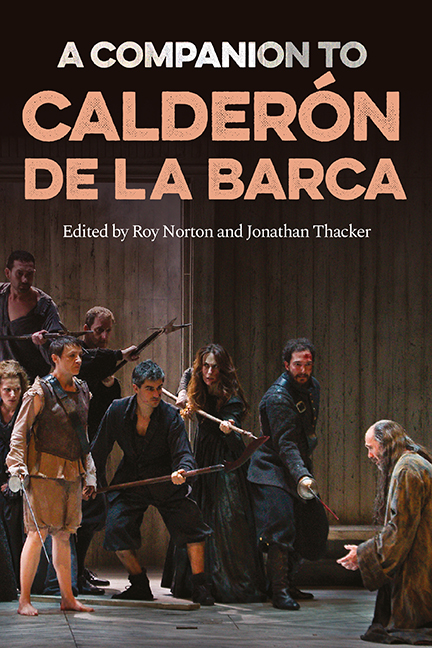Book contents
- Frontmatter
- Dedication
- Contents
- List of Illustrations
- List of Contributors
- Acknowledgements
- List of Abbreviations
- Introduction
- 1 Biography and Context
- 2 The Calderonian World
- 3 The Playwright’s Craft: Calderón and the Great Theatrical World of Early Modern Spain
- 4 La vida es sueño
- 5 The Honour Plays of Calderón
- 6 Calderón, the Comedian
- 7 Mythological Court Spectacle Plays
- 8 Religious comedias
- 9 Calderón’s ‘Sacramental, Allegorical and Historical’ autos
- 10 Calderón’s graciosos
- 11 Calderón and Visual Art
- 12 The Staging of Calderón’s Theatre
- 13 Calderón’s European Reception from Romanticism to the Twentieth Century
- 14 The Reception of Calderón in the Hispanic World
- Appendices
- Consolidated Bibliography
- Index
- Tamesis • Companions
7 - Mythological Court Spectacle Plays
Published online by Cambridge University Press: 07 October 2022
- Frontmatter
- Dedication
- Contents
- List of Illustrations
- List of Contributors
- Acknowledgements
- List of Abbreviations
- Introduction
- 1 Biography and Context
- 2 The Calderonian World
- 3 The Playwright’s Craft: Calderón and the Great Theatrical World of Early Modern Spain
- 4 La vida es sueño
- 5 The Honour Plays of Calderón
- 6 Calderón, the Comedian
- 7 Mythological Court Spectacle Plays
- 8 Religious comedias
- 9 Calderón’s ‘Sacramental, Allegorical and Historical’ autos
- 10 Calderón’s graciosos
- 11 Calderón and Visual Art
- 12 The Staging of Calderón’s Theatre
- 13 Calderón’s European Reception from Romanticism to the Twentieth Century
- 14 The Reception of Calderón in the Hispanic World
- Appendices
- Consolidated Bibliography
- Index
- Tamesis • Companions
Summary
References to Calderón's mythological plays regularly – and appropriately – add the adjectives ‘court’ and ‘spectacle’ to the classification. While the court venue encompasses his entire theatrical career, virtually all Calderón's plays based on classical mythology were staged as elaborate spectacle performances.
Spectacle was a regular feature of court performance long before Calderón's era. Theatrical or paratheatrical spectacles constituted much more than entertainment or ritual celebration for royalty and the nobility in early modern Spain; they were an essential ingredient in establishing and maintaining their power and prestige. As Jurgen Habermas states, ‘lordship was something publicly represented’. It was a status attribute, an embodied representation of the lord's authority, displaying an ‘aura [that] surrounded and endowed his authority’. Particularly in the case of the king as supreme lord, ‘representation’ was intended to connect him visibly to an invisible higher power; hence the frequency of Christian religious symbolism in royal paratheatrical spectacles. Because of their power to constitute authority visually, they were an integral part of coronation festivities, royal weddings, celebrations of princely births, royal entries into important cities of the realm, and of the elaborate banquets, jousts and masques that accompanied those events. Although meaning conveyed by elaborate (and expensive) visual spectacle pre-dominated, parts of the spectacle also involved poetic texts spoken or sung by the performers, with musical accompaniment. They were largely what we would today call amateur productions, written and performed by servants and courtiers. Since the courtiers’ objectives were both serving the monarch and cultivating his favour by calling attention to their own excellence, the particular preferences of the monarch in power – and of the queen as well – played an important role in the number and types of paratheatrical and theatrical performances. As Furio Ceriol wrote in 1559, ‘quando el príncipe es poeta, todos hazemos coplas; quando es músico, todos cantamos y tañemos; quando es guerrero, todos tratamos en armas’ [when the prince is a poet, we all write verse; when he is a musician, we all sing and play; when he is a warrior, we all deal in arms]. Isabella of Castile liked theatrical performance and participated in or sponsored court performances including masques, some with theatrical staging.
- Type
- Chapter
- Information
- A Companion to Calderón de la Barca , pp. 132 - 153Publisher: Boydell & BrewerPrint publication year: 2021



